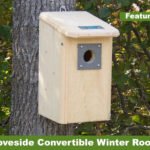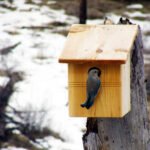During the spring, when eggs are hatching and chicks are cheeping, baby birds are highly susceptible to falling out of nests. If you ever find a small bird on the ground that is unable to fly, here are the steps you should take to make sure it stays safe and healthy.

1. Find out whether the bird is a nestling or fledgling
If you find a small bird on the ground outside your home or in another area, the first thing you should do is find out whether the bird is a nestling or a fledgling. A nestling is a newborn, while a fledgling is an adolescent bird. Watch the bird or stick your finger out next to it. If it’s able to hop around or perch on your finger, it’s most likely a fledgling that attempted to fly out of its nest. Fledglings often try to fly out of their nest but fail on the first time. The mother will continue to feed it and care for it, but just make sure it’s not in any immediate danger of predators like cats.
2. Warm it up and place the nestling back in the nest
If you’ve determined the bird to be a nestling, because it can’t move very much and looks underdeveloped, it probably fell out of its nest from a nearby tree. Look around the area above the fallen bird for a nest. Gently cup the bird in your hand to warm it up and place the bird back in its nest. If you don’t see any nests around or you’re not sure which one it is, move onto the nest step.
3. Build a makeshift replacement nest
Sometimes bird nests get completely blown over, you can’t reach it or you simply can’t find it. If this is the case, you will need to construct your own nest for the bird. Get a small wicker basket or a cottage cheese tub with holes punches into the bottom for drainage. Line it with tissue, straw and dried sticks.
4. Tie the replacement nest to a tree
After you’ve constructed the makeshift nest, tie it very securely to a nearby tree or just below the other nest. Make sure it will not fall down from heavy wind. Warm the nestling in your cupped hands briefly and place it into the new nest. Once the parents see that the bird is missing, they will search the immediate area. If they find the new nest, they will adopt the new one as their own and continue to feed and care for the nestling.
5. If the parents don’t return, call a veterinarian
Unfortunately, the parents may not always be able to find the nestling, so call a local wildlife specialist or veterinarian, if the parents do not return within a few hours.


